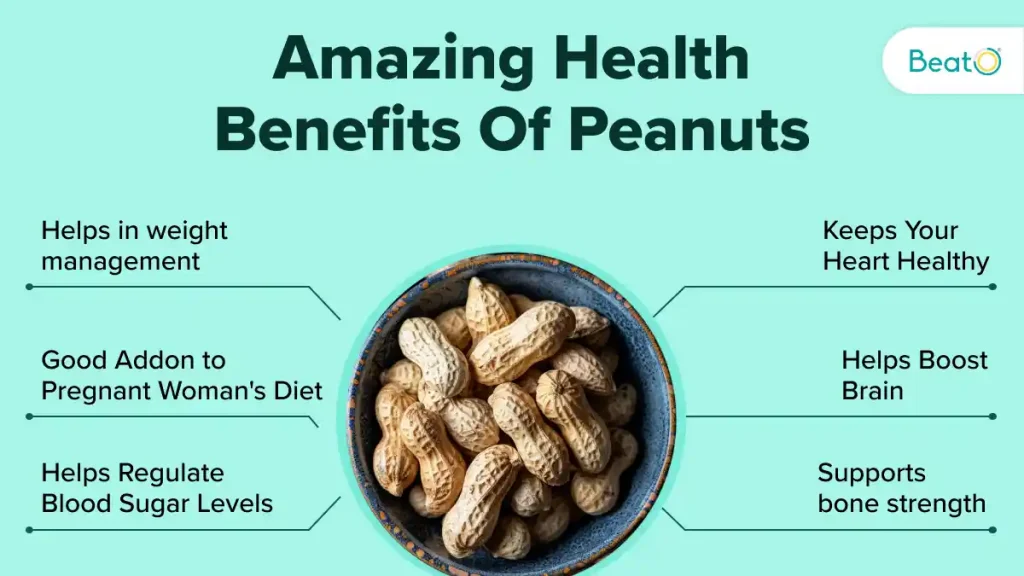Peanuts, also known as Mungfali in Hindi, are a popular and versatile snack enjoyed across India. They’re a little bundle with big health benefits. Hidden beneath their shell is a whole world of good stuff for your body. These nuts grow under the ground, which is why some folks call them “Groundnuts”. They’re delicious and packed with energy, fats that are good for your heart, lots of protein for your muscles, and fibres that keep your tummy happy.

Peanuts can help you stay in shape, keep your heart beating strong, balance your sugar levels, make your bones tough, help moms-to-be and their babies, boost your brainpower, protect you from getting sick, and even make you feel happier and look better! So, let’s dive into why peanuts are such a cool snack, benefits of peanuts and how munching on them can do wonders for your health.
Also Read:7 Simple Yoga Asanas To reduce Belly Fat
Nutritional Breakdown of Peanuts
Energy-packed: With 567 calories per 100 grams, peanuts are a great energy source.
Rich in Healthy Fats: They have a lot of healthy fats, mostly monounsaturated and polyunsaturated which are good for your heart.
Protein Powerhouse: Offering 25.8 grams of protein, peanuts help in muscle building and repair.
Fibre: With 8.5 grams of fibre, peanuts aid digestion and keep you full longer.
Vitamins and Minerals Galore: Peanuts are also packed with vitamins and minerals like Vitamin E, Niacin (which is Vitamin B3), Magnesium, Phosphorus, and Zinc, all of which help keep you healthy.
Also Read: Cultivating Balance: Exploring Trikonasana Benefits And Proper Technique To Do It!
Explore the Amazing Health Benefits of Peanuts (Mungfali)

Here are some of the important Health Benefits of Peanuts:
1. Management of Weight
Incorporating peanuts into a balanced diet can support weight management efforts due to their high protein and fibre content. These nutrients promote satiety, helping to reduce overall calorie intake by keeping you fuller for longer periods. Despite their high-fat content, peanuts are rich in beneficial monounsaturated and polyunsaturated fats, contributing to a nutritious diet for those looking to maintain a healthy weight.
2. Keeps Your Heart Happy
Peanuts can play a significant role in maintaining cardiovascular health. Their high content of heart-healthy fats, along with fibre and niacin, helps to reduce cholesterol levels and lower the risk of heart disease. Additionally, peanuts contain resveratrol, an antioxidant known for its heart-protective benefits and potential to improve blood flow.
Also Read: Yoga for Diabetics: Six Yoga Asanas for Diabetes Management
3. Sweet News for Blood Sugar
For individuals managing diabetes or aiming to regulate blood sugar levels, peanuts are an excellent dietary choice. Peanuts are packed with fibre, protein, and healthy fats, which keep your blood sugar steady. This makes peanuts a smart snack for maintaining stable blood sugar levels and the benefits of peanuts can truly help people with diabetes.
4. Strengthening Bone Health
Peanuts are rich in magnesium and phosphorus, essential minerals that support bone strength and development. Regular consumption of peanuts can contribute to the maintenance of healthy bones and reduce the risk of osteoporosis, especially in older adults.
Also Read: Yoga for Diabetes: Best Asanas/Poses With Steps For You
5. Motherhood’s Little Helper
Peanuts are a nutritious addition to a pregnant woman’s diet, providing a good source of folate. Folate is crucial for the development of the baby’s brain and spine, reducing the risk of birth defects. Furthermore, the protein and healthy fats present in peanuts can aid in improving the health of both the mother and the growing fetus.
6. Brain Booster
This is one of the most important health benefits of peanuts, Niacin, or Vitamin B3, found abundantly in peanuts, is vital for brain health and may protect against cognitive decline. Peanuts also contain resveratrol, which has been linked to improved blood flow to the brain, potentially reducing the risk of stroke and enhancing cognitive functions.
Also Read: The Healing Power of Chair Restorative Yoga | A Complete Guide
7. Boosting Immunity
The high content of Vitamin E and zinc in peanuts plays a crucial role in strengthening the immune system. Vitamin E acts as an antioxidant, helping to protect the body against free radical damage, while zinc is essential for immune cell function and wound healing.
8. Skin Savior
Peanuts are like a secret potion for your skin. They’re packed with Vitamin E, an antioxidant that helps protect your skin from damage caused by the sun and pollution. Think of it as a shield that keeps your skin looking young, vibrant, and free from blemishes. Plus, the healthy fats in peanuts give your skin a natural glow, making it look healthy and radiant.
Also Read: Ardha Chakrasana Benefits: The Key To Overall Health And Wellness
9. Digestive Health Ally
Peanuts might just be the unsung heroes of digestive health. The fibre content in peanuts isn’t just about keeping you full; it also plays a crucial role in keeping your digestive system running smoothly. Fiber helps promote regular bowel movements, preventing constipation and supporting a healthy gut microbiome. Think of peanuts as a broom, sweeping through your digestive tract and keeping everything clean and functioning properly.
10. Muscle and Strength Builder
For those looking to build muscle or maintain muscle strength, peanuts are a fantastic ally. Their high protein content is essential for repairing and building muscle tissue, especially after workouts. Plus, the magnesium in peanuts plays a critical role in muscle function, helping to prevent cramps and fatigue. Incorporating peanuts into your post-workout snack can aid in muscle recovery and growth, helping you get stronger over time.
11. An Antioxidant Powerhouse
Antioxidants are like your body’s personal defence team against damage from free radicals, which are unstable molecules that can harm cells. Peanuts are loaded with antioxidants, notably resveratrol, which is the same beneficial compound found in red wine. These antioxidants help protect your cells from damage, reducing your risk of chronic diseases and keeping your body running like a well-oiled machine.
Also Read:Health Benefits Of Hibiscus Tea
12. Helps Fight Inflammation
Inflammation is your body’s natural response to injury or infection, but chronic inflammation can lead to various health issues. Peanuts contain anti-inflammatory properties thanks to their healthy fats, antioxidants, and nutrients like magnesium. Regular consumption of peanuts can help lower inflammation in your body, offering protection against conditions like arthritis, heart disease, and diabetes.
Peanuts, with their myriad health benefits, can easily be a part of your daily nutrition. Whether you’re looking to improve your skin, lift your mood, or build muscle, adding peanuts to your meals and snacks is a simple and tasty way to enhance your health.
Note: While peanuts are beneficial, consuming them in moderation is key to maintaining a balanced diet.
Bringing Peanuts into Your Diet:
Peanuts can be enjoyed in various forms – raw, roasted, as peanut butter, or added to dishes for a nutritional boost. Here are some ways to incorporate the benefits of peanuts into your diet :
- Snacks: Roasted peanuts, seasoned with spices, make a healthy and satisfying snack.
- Salads: Sprinkle chopped peanuts over salads for a crunchy texture and a dose of healthy fats.
- Peanut Butter: Use natural peanut butter as a spread on whole-grain bread or mix it into smoothies along with oats or a chopped banana for a protein boost.
- Desserts: Add peanuts to desserts like chikkis (traditional Indian sweets) or peanut butter cookies for a nutritious twist.
- Energy Bars: Homemade energy bars with peanuts, oats, and honey can be a great post-workout snack or a quick breakfast option.
Conclusion:
To wrap up, Peanuts serve as a tiny yet mighty force in both our diets and kitchens. The health benefits of Peanuts span from enhancing heart health and aiding weight management to boosting mood and brain power. Peanuts not only enrich our meals with their delightful crunch and flavour but also contribute significantly to a nutritious lifestyle. They seamlessly blend tradition with nourishment, making them a cherished staple in Indian cuisine.
Yet, the key to harnessing the full potential benefits of peanuts lies in moderation and mindful consumption, especially considering individual health concerns like allergies. When enjoyed responsibly, peanuts can be a delicious pathway to enhancing overall health and well-being, proving that sometimes the smallest things can indeed have the largest impact on our lives.
Also Read:Is Jackfruit Good For Diabetes?
Disclaimer: The content of this article is compiled information from generic and public sources. It is in no way a substitute, suggestion, or advice for a qualified medical opinion. Always consult a specialist or your own doctor for more information. Beato App does not claim responsibility for this information.
Are you looking for the perfect glucometer to check your blood sugar level? Try out BeatO smartglucometerkit, affordable and easy to use.
Discover top-tier diabetes care with BeatO’s Chief Clinical Officer,Dr. Navneet Agarwal. His expertise in Diabetes ensures personalised guidance for overall health. Try out a smartglucometerand keep track of blood sugar levels now.




